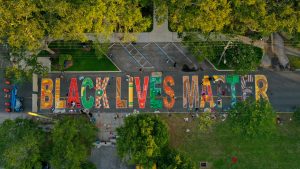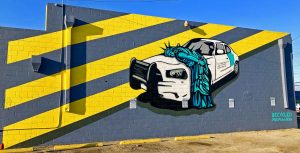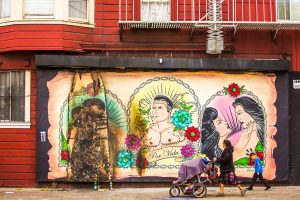Environmental Murals
Preface: Hello, my names Carol Teran, and my portfolio is titled “Environmental Murals”. The creative commons license I’ll be using is CC BY-ND 2.0.
Introduction: The intention for my portfolio is to show the relationship between environments and how they influence the development of social movements. This is evident through artistic expression within the infrastructure of said communities. Murals, in particular, are used to illustrate messages that ultimately convey deeper meanings of social phenomena.
Themes: This is relevant to the idea of nature v nurture: our perceptions of the world are shaped not only by our innate sense of self, but also the environment around us. Which in turn makes us aware of social, political and cultural drawbacks. The second theme is the location in which each mural was constructed. As you read, the placement of the murals in the environment further generated conversations on social injustices being faced.



The first mural was painted in front of the Dr. Carter G. Woodson African American Museum. Brought to light on this year’s Juneteenth, each letter was produced by a different local artist, it sheds a light on the systemic racism faced in America by Black citizens. Within the letters, there are further stories being told through old and new age history. “M” depicts Martin Luther King, surrounded by his historical “I Have a Dream” speech, while the “T” renders a portrait of George Floyd, who is just one of many who has recently been on the unlucky end of a poor system. Other letters convey Black culture, such as women with Black hairstyles, fashion trends started within the Black community, and African American styles of art. All put together, the mural portrays a great message to those within the community and being placed in such a publicly noticeable location in the environment makes it so that it cannot go unnoticed. The importance of this mural being placed in front an African American Museum is that what is being portrayed in every letter is relevant to Black people in America now, showing that although it has been many years since many historical events such as the abolishment of slavery or the Civil Rights movement, Black people in America are still trapped in the system that constantly fails them in this country. It is a relevant topic that people can no longer turn a blind eye to it.
The second picture was created by artist Isaac Zevalking. When asked about the art, he responds by explaining the purpose of the mural is to address the “anti-immigration rhetoric in America.” The Statue of Liberty ought to be a sign of welcoming hope and freedom, yet that has been far from the case. America does not delineate the level of liberation as once known. Many people are against certain groups of people coming to America, and when they do come here, they are often discriminated against. Lady Liberty is shown being detained by ICE, (Immigration and Custom Enforcement) she is the symbol for immigrants which are constantly being detained by ICE, even for minor crimes or no crimes at all. The United States is supposed to be a place of freedom, justice, and new beginnings. However, when immigrants come here, they often face the opposite. To bring attention to said issue, it was unveiled in Las Vegas, in the downtown Arts District near Main Street and Charleston Boulevard. Furthermore, it’s painted on the side of a bail bonds building, which handles lot of immigration cases. The location of this mural is a huge factor, making sure the message of social injustice can’t be neglected within the community.
The last picture is by artist Miguel Paul. In the painting, from left to right, it begins with two gay men followed by a transgender man and ends with a lesbian couple. Very clearly, to the far left the mural has been vandalized almost beyond recognition. But that has not been the first time, this mural has been defaced a total of three times. It is painted outside of the “Galeria de la Raza”, located in San Francisco, in the mission district. The mission district houses a lot of Latino institutions, as well as art. The mural came after the legalization of gay marriage, which in Latino communities isn’t as accepted. The toxic masculinity and non-progressive ideas are very prominent in the Latinx community. In Hispanic environments its frowned upon to be gay, or questioning, the uncertainty amongst sexuality makes people uneasy to they see it as wrong. This triggered unacceptance, which prompted the reaction it received. Regardless of the fact that it disturbed the peace, it’s important to show that generational stigmas are being broken.

